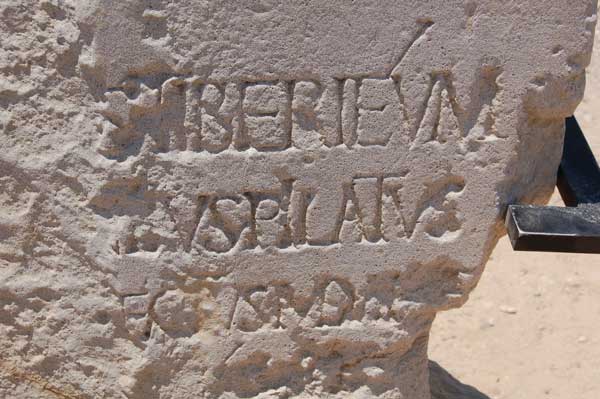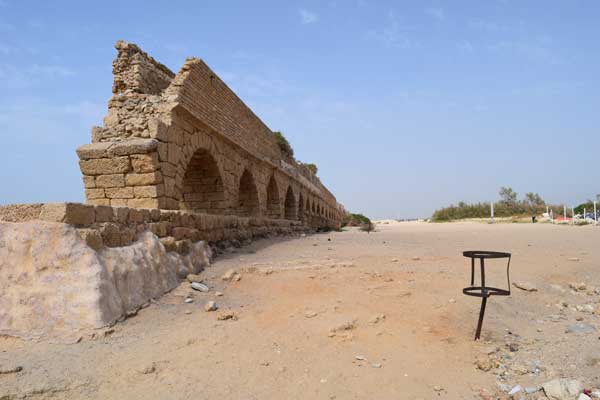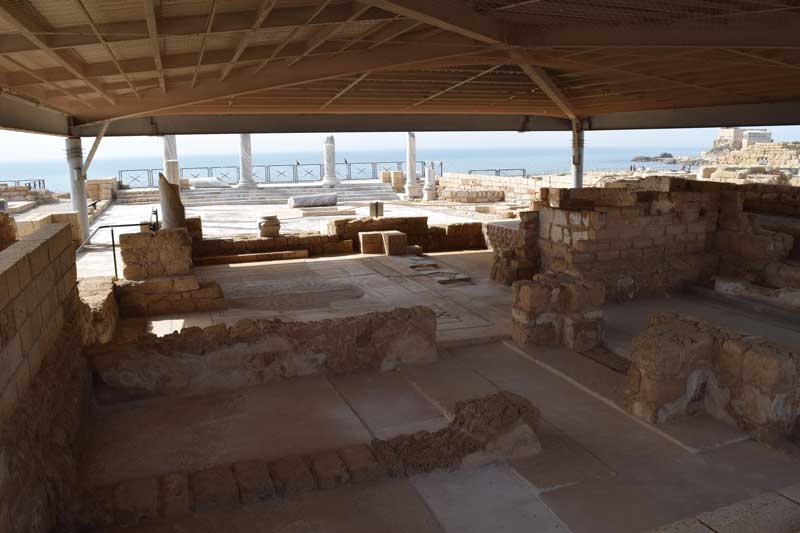ISRAEL PHOTOS VI
-- ISRAEL REVISITED
|
Caesarea
Caesarea was the Roman capitol of Judea during Jesus' day.
The Roman Prefect Pontius Pilate had a higher rank than Herod Antipas. A
stone with the name of Pontius Pilate was found in a step of the Roman
theater at Caesarea (Maritima). The theater went through numerous repairs
and renovations since it was built before Jesus' day.

Replica of Pontius Pilate Inscription
Paul was held in a prison at Caesarea in 58 AD before going to Rome to
stand trial. At his first trial in Caesarea, Paul appealed to Caesar after
some leading men from Jerusalem demanded his execution. Paul lived in Rome
for two years before he was executed.
The Roman provinces in Israel were not exempt from taxes. Taxes were taken
to fund the military, government and public works. There is an aqueduct at
Caesarea. There is a theater and hippodrome. There were large houses and
public buildings. There were warehouses used to store commodities being
shipped to and from the area. Expensive stone pillars were imported from
around the Mediterranean.

Caearea Aqueduct - Paid for by Roman Empire taxpayers
During Jesus' day the locals complained about taxes. Jesus was asked if it
was right to pay taxes to Caesar. Mark 12:13 They sent some of the
Pharisees and of the Herodians to him, that they might trap him with
words. 14 When they had come, they asked him, "Teacher, we know that you
are honest, and don't defer to anyone; for you aren't partial to anyone,
but truly teach the way of God. Is it lawful to pay taxes to Caesar, or
not? 15 Shall we give, or shall we not give?" But he, knowing their
hypocrisy, said to them, "Why do you test me? Bring me a denarius, that I
may see it." 16 They brought it. He said to them, "Whose is this image and
inscription?" They said to him, "Caesar's." 17 Jesus answered them,
"Render to Caesar the things that are Caesar's, and to God the things that
are God's." They marveled greatly at him.

Some of the ruling class afforded fine homes and owned
slaves -- Paid for by taxpayers
Through the ages, people have complained about the taxes. Ben Franklin
came up with a good statement about this in his book 'Way to Wealth'
(1758):
Judge then how much I must have been gratified by an incident I am going
to relate to you. I stopped my horse lately where a great number of people
were collected at a venue of merchant goods. The hour of sale not being
come, they were conversing on the badness of the times, and one of the
company called to a plain clean old man, with white locks, "Pray, Father
Abraham, what think you of the times? Won't these heavy taxes quite ruin
the country? How shall we be ever able to pay them? What would you advise
us to?" Father Abraham stood up, and replied, "If you'd have my advice,
I'll give it you in short, for a word to the wise is enough, and many
words won't fill a bushel, as Poor Richard says." They joined in desiring
him to speak his mind, and gathering round him, he proceeded as
follows: "Friends, says he, and neighbors, the taxes are indeed very
heavy, and if those laid on by the government were the only ones we had to
pay, we might more easily discharge them; but we have many others, and
much more grievous to some of us. We are taxed twice as much by our
idleness, three times as much by our pride, and four times as much by our
folly, and from these taxes the commissioners cannot ease or deliver us by
allowing an abatement. However let us hearken to good advice, and
something may be done for us; God helps them that help themselves, as Poor
Richard says, in his almanac of 1733. "It would be thought a hard
government that should tax its people one tenth part of their time, to be
employed in its service. But idleness taxes many of us much more, if we
reckon all that is spent in absolute sloth, or doing of nothing, with that
which is spent in idle employments or amusements, that amount to nothing.
Sloth, by bringing on diseases, absolutely shortens life. Sloth, like
rust, consumes faster than labor wears, while the used key is always
bright, as Poor Richard says. But dost thou love life, then do not
squander time, for that's the stuff life is made of, as Poor Richard says.
How much more than is necessary do we spend in sleep! forgetting that the
sleeping fox catches no poultry, and that there will be sleeping enough in
the grave, as Poor Richard says. If time be of all things the most
precious, wasting time must be, as Poor Richard says, the greatest
prodigality, since, as he elsewhere tells us, lost time is never found
again, and what we call time-enough, always proves little enough: let us
then be up and be doing, and doing to the purpose; so by diligence shall
we do more with less perplexity. Sloth makes all things difficult, but
industry all easy, as Poor Richard says; and he that riseth late, must
trot all day, and shall scarce overtake his business at night. While
laziness travels so slowly, that poverty soon overtakes him, as we read in
Poor Richard, who adds, drive thy business, let not that drive thee; and
early to bed, and early to rise, makes a man healthy, wealthy and wise.
"So what signifies wishing and hoping for better times. We may make these
times better if we bestir ourselves. Industry need not wish, as Poor
Richard says, and he that lives upon hope will die fasting. There are no
gains, without pains, then help hands, for I have no lands, or if I have,
they are smartly taxed. And, as Poor Richard likewise observes, he that
hath a trade hath an estate, and he that hath a calling hath an office of
profit and honor; but then the trade must be worked at, and the calling
well followed, or neither the estate, nor the office, will enable us to
pay our taxes. If we are industrious we shall never starve; for, as Poor
Richard says, at the working man's house hunger looks in, but dares not
enter. Nor will the bailiff nor the constable enter, for industry pays
debts, while despair increaseth them, says Poor Richard. What though you
have found no treasure, nor has any rich relation left you a legacy,
diligence is the mother of good luck, as Poor Richard says, and God gives
all things to industry. Then plough deep, while sluggards sleep, and you
shall have corn to sell and to keep, says Poor Dick. Work while it is
called today, for you know not how much you may be hindered tomorrow,
which makes Poor Richard say, one today is worth two tomorrows; and
farther, have you somewhat to do tomorrow, do it today.
Home Page
Nazareth Cliff
Cliff Survey
Cliff Cross Section
Gennesareth
Magdala
Old Tiberias
Sea of Galilee Fishing
Nain
Caesarea
Egypt in Ancient Israel
Khirbet Qeiyafa
Siloam
Written by
David Q. Hall dqhall59@yahoo.com
ISRAEL PHOTOS V
ISRAEL PHOTOS IV
ISRAEL
PHOTOS III
ISRAEL PHOTOS II
ISRAEL PHOTOS
May use photos and text for
non-profit publication. For profit usage subject to approval.


